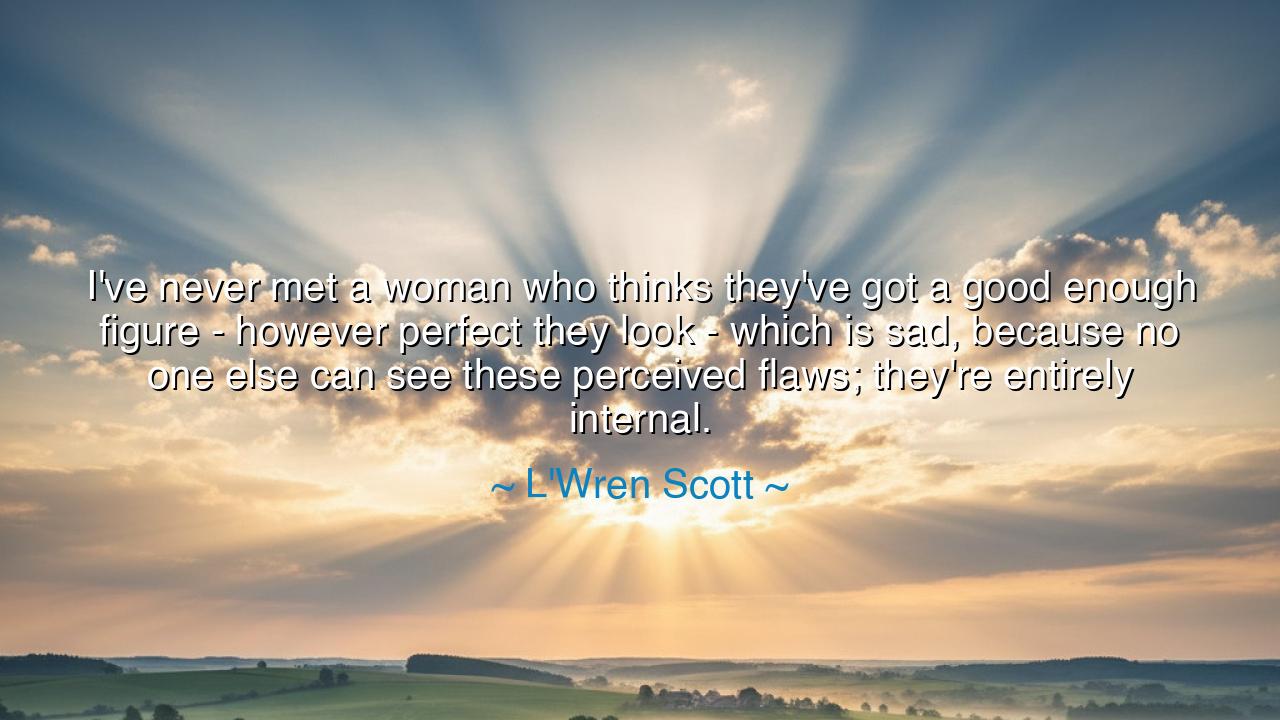
I've never met a woman who thinks they've got a good enough
I've never met a woman who thinks they've got a good enough figure - however perfect they look - which is sad, because no one else can see these perceived flaws; they're entirely internal.






The words of L’Wren Scott strike with a painful and timeless clarity: “I’ve never met a woman who thinks they’ve got a good enough figure – however perfect they look – which is sad, because no one else can see these perceived flaws; they’re entirely internal.” In this observation, she uncovers a paradox of the human spirit, especially in women, though not limited to them: that the mirror does not always reflect truth, but instead magnifies doubt and insecurity. What others see as radiant beauty, the bearer often sees as imperfection, and thus the prison of the mind becomes stronger than the body itself.
The origin of these words comes from Scott’s experience in the world of fashion, where she dressed women of power and fame, women celebrated as the epitome of beauty. Yet, even among them, she found dissatisfaction. She witnessed the secret sighs and whispered criticisms that women gave themselves, even when the world adored them. It is here that her insight was born: that self-criticism, driven by comparison and culture, blinds us to the beauty that others plainly see.
The ancients also knew this conflict. In Greece, sculptors carved statues of goddesses with perfect form, yet the women of Athens, though closer to these ideals than we, still adorned themselves with oils, jewelry, and garments to mask what they felt was lacking. In Rome, women applied cosmetics made from lead and chalk despite their dangers, seeking to alter faces that others might have already found lovely. This pursuit was not born from truth but from the silent tyranny of internal flaws, imagined yet powerful.
History provides the striking example of Empress Elisabeth of Austria, known as “Sisi.” Renowned as one of the most beautiful women of her age, she nonetheless obsessed over her body, weighing herself daily, binding her waist with cruelty, and limiting her meals to remain slim. To the world, she was the pinnacle of grace, but to herself, she was never enough. Her life reflects Scott’s insight: perceived flaws can torment the soul even when beauty is evident to all others.
Scott’s words are also a lament for the sadness of wasted joy. For when a woman—or indeed, any person—cannot see their own worth, they rob themselves of peace and deny themselves the delight of their own reflection. What should be a source of gratitude becomes instead a battlefield of insecurity. The tragedy lies not in the body, but in the eyes that judge it falsely. The flaw is not in the flesh but in the perception.
The lesson we must draw is this: guard your mind more than your mirror. Recognize that beauty is not measured by the harsh scales of self-judgment, but by the grace of presence, the strength of spirit, and the love others see shining through you. Do not let invisible chains bind you to despair over what only you imagine as imperfect. The body, in its natural form, carries dignity, and the soul that accepts it walks in freedom.
Practical action lies before us: practice gratitude for the body that carries you. When you look into the mirror, do not search for flaws but for blessings. Speak to yourself not with criticism but with kindness. And when others confide their insecurities, remind them gently that what they fear is invisible to the world. In time, this practice of compassion—both toward yourself and others—can break the cycle of endless dissatisfaction.
So let us remember L’Wren Scott’s wisdom. Perceived flaws are internal, illusions that rob us of joy. To free ourselves from them is to reclaim peace, to live with gratitude, and to honor the fragile beauty of life. For in truth, perfection is not found in the absence of flaws, but in the acceptance of the self, as it is, radiant and whole.






AAdministratorAdministrator
Welcome, honored guests. Please leave a comment, we will respond soon